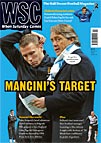 Matt Withers looks at a fierce neighbourhood feud between the clubs of a Cheshire market town
Matt Withers looks at a fierce neighbourhood feud between the clubs of a Cheshire market town
In November, a week prior to Northwich Victoria’s home FA Cup second round victory over Charlton, Graham Shuttleworth, enterprising secretary of town rivals Witton Albion, took to Addicks message boards. Albion offered travelling Charlton supporters parking at their ground for £2 on the day, along with opening the social club early to offer them “a comfort break, a drink or something hot to eat”, while “no doubt enjoying the build-up to your game on the large screen”.
On a good day, Albion’s Wincham Park is a ten minute walk over a canal footpath from Victoria Park. Local rivals mucking in to ensure their neighbour’s big day goes off smoothly? The whole community, you may think, coming together and putting rivalries aside? Not quite.
“Misplaced opportunism” was one of the kinder analyses of Northwich Victoria fans. More common were comments that their rivals were “just trying to feed off the occasion, as any good parasite worth his intestine would”. Vics fans fumed at the club some unkindly refer to as “Swampmonsters” hijacking their moment in the sun. Such is the visceral level of mutual dislike between the teams of Northwich, separated by little more than a mile and two divisions.
It’s one of the more enduring quirks of English non-League football that a town of around 19,000 can harbour two clubs of not dissimilar sizes with a rivalry that can compare with bigger cross-city antagonisms in its ferocity.
Witness the televised coverage of the Charlton game, where Vics fans kept up their anti-Witton chants for much of the match. An apologetic Peter Drury was forced to explain that at non-League grounds microphones are close to the ground, picking up what he euphemistically dubbed “choice language”.
The rivalry between the two burns with an intensity unfathomable to anybody outside the town. Officially, Victoria’s “true” rivals are Altrincham, a league above them in the Blue Square Premier. But when it suits them – which is most match days – they return to directing their ire at Witton, down in the Unibond League Division One South.
Albion, meanwhile, fume at what they see as a club which appears to get away with anything, while they – the ones who play by the rules – are left in the shadows.
Witton were borne of Victoria’s brief flirtation with professionalism. The Vics spent two years in the Second Division of the Football League in the 1890s but soon realised they could not sustain full-time football. By the time they reverted to non-League status many of the club’s gentleman amateur players, enraged by this repudiation of Corinthian values, had already broken away to form Witton Albion, cementing a kind of moral superiority which remains to this day.
This has been reflected in their respective financial issues. Witton have had their setbacks – a cashflow problem saw the club forced to release almost its entire first-team squad last year – but it’s nothing compared to Northwich’s well-documented fiscal woes. Legal difficulties, changes of ownership, threats of closure, temporary ground shares and fearsome debts have all been put in their way over recent years, but somehow – and to the undisguised chagrin of Albion fans – Northwich always, somehow, end up in one piece.
During a low point for Northwich earlier this decade and prior to moving into their new stadium the Vics were thrown into a groundshare at Witton. Attendances – previously 1,000 on a good day, 3,000-4,000 if drawing League opposition in the FA Cup – dropped instantly to around 700. Fans happy to travel to the likes of Gravesend for an away day could not bring themselves to enter their rival’s domain. Attendances for irregular derby games thrown up by competitions such as the Cheshire Senior Cup have sometimes been surprisingly low, less for a lack of interest but the refusal of fans to give a penny to their rivals.
Furthermore, in the 1980s, Witton sold their ground to Sainsbury’s in return for the supermarket building them a new ground. Urban legend in Northwich suggests that there are still Vics fans who will not shop in the store. As one fan in the town remarked: “You’re either Northwich-ite or Witton-ite. And that’s the way it is.” Witton, on the other hand, remain wracked with envy at the Vics, both at the coverage they get from the Northwich Guardian – the local newspaper, where they’re perennially confined to a right-hand page inside – and on a wider scene.
Remember Ever Decreasing Circles, the 1980s sitcom which really could have been set in Cheshire, the home county which, by a quirk, ended up in the north-west? Witton is Richard Briers, the neighbour who is fed up living next to Northwich’s Paul Egan, the lovable rogue who gets away with it every time while restrained Witton stays within the rules. Every now and again they watch Northwich rock up in a new, shiny car, usually with a new mistress in tow and then watch, with undisguised glee, as they fall out. And then, shortly afterwards, go through the entire rigmarole again.
From WSC 276 February 2010